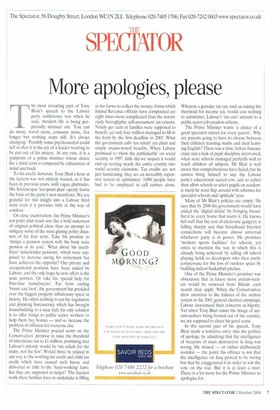ore apologies, please
The most revealing part of Tony Blair's speech to the Labour party conference was when he said, 'modern life is being perpetually stressed out. You can do more, travel more, consume more, live longer but nothing stops still. It's always changing.' Possibly some psychoanalyst could tell us that it is the cry of a leader wanting to be put out of his misery. At any rate, it is a symptom of a prime minister whose desire for a third term is tempered by exhaustion of mind and body.
To his credit, however, Tony Blair's hour at the lectern was not entirely wasted, as it has been in previous years, with vague platitudes. His Smietesque 'ten-point plan' openly forms the basis of the party's next manifesto. We are grateful for this insight into a Labour third term even if it provides little in the way of comfort.
On close examination, the Prime Minister's ten-point plan reads less like a bold statement of original political ideas than an attempt to mitigate some of the most glaring policy disasters of his first term. Take his promise to 'design a pension system with the basic state pension at its core'. What about his muchfeted 'stakeholder pensions', which were supposed to increase saving for retirement but have achieved the opposite? Our private and occupational pensions have been raided by Labour, and the only hope he now offers is the state pension. Or take his 'special help for first-time homebuyers'. Far from ending 'boom and bust', the government has presided over the biggest property inflationary spiral in history. He offers nothing to cut the regulation and planning bureaucracy which has brought housebuilding to a near halt; his only solution is to offer bungs to public sector workers to help them buy homes — and so increase the problem of inflation for everyone else.
The Prime Minister poured scorn on the Conservatives' promise to raise the threshold of inheritance tax to 11 million, promising that Labour's priority would be 'tax reliefs for the many, not the few'. Would these be related in any way to the working tax credit and child tax credit which have caused such havoc and delivered so little to the 'hard-working' families they are supposed to target? The hardest work these families have to undertake is filling in the forms to collect the money; forms which Inland Revenue officials have complained are eight times more complicated than the notoriously hieroglyphic self-assessment tax returns. Ninety per cent of families were supposed to benefit, yet only four million managed to fill in the form by the first deadline in 2003. What the government calls 'tax reliefs' are plain and simple means-tested benefits. When Labour promised to 'think the unthinkable' on social security in 1997, little did we suspect it would end up turning nearly the entire country into social security claimants. Tax credits are not just humiliating, they are an incredibly expensive system to administer: 3,000 people have had to be employed in call centres alone. Whereas a genuine tax cut, such as raising the threshold for income tax, would cost nothing to administer, Labour's 'tax cuts' amount to a public sector job creation scheme.
The Prime Minister wants 'a choice of a good specialist school for every parent'. Why are parents going to have to choose between their children learning maths and their learning English? There was a time, before bureaucracy and a lack of pupil discipline intervened, when state schools managed perfectly well to teach children all subjects. Mr Blair is well aware that comprehensives have failed, but he cannot bring himself to slay the Labour party's educational sacred cow, and so rather than allow schools to select pupils on academic merit he must flap around with schemes for specialist schools and 'aptitude' tests.
Many of Mr Blair's policies are empty. He says that by 2008 his government would have ended the 'digital divide' by bringing broadband to every home that wants it. He knows full well that the cost of electronic gadgetry is falling sharply and that broadband Internet connections will become almost universal whichever party is in power. He promises 'modern sports facilities' for schools, yet omits to mention the way in which this is already being achieved: by selling off school playing fields to developers who then partly compensate for the loss of outdoor space by building indoor basketball pitches.
One of the Prime Minister's promises was obnoxious: that in future more asylum-seekers would be removed from Britain each month than apply. When the Conservatives drew attention to the failures of the asylum system in the 2001 general election campaign, Labour denounced their concerns as bigotry. Yet when Tony Blair raises the image of asylum-seekers being booted out of the country, we are supposed to cheer his good sense.
In the second part of his speech, Tony Blair made a tentative entry into the politics of apology, by admitting that the intelligence of weapons of mass destruction in Iraq was wrong. He missed — or rather deliberately avoided — the point: his offence is not that the intelligence on Iraq proved to be wrong but that he exaggerated it in order to win the vote on the war. But it is at least a start. There is a lot more for the Prime Minister to apologise for.


















































































 Previous page
Previous page